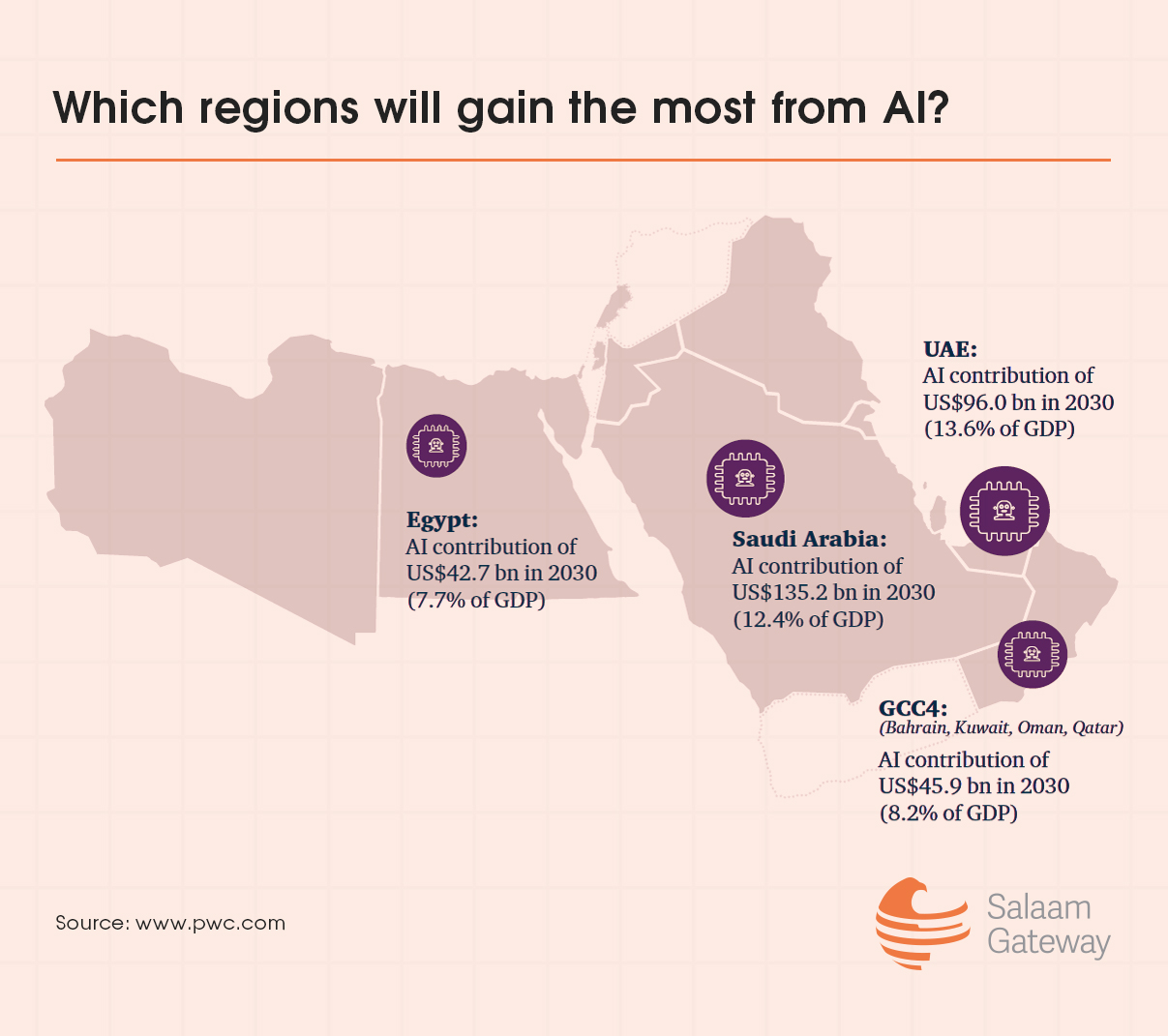How AI is powering the future of the Islamic economy
Artificial intelligence (AI) is rapidly emerging as a transformative force within the Islamic economy, driving innovation across sectors from finance and food to tourism and education.
By enhancing Shariah compliance, improving accessibility, and enabling personalized services, the technology is reshaping how the Islamic economy operates, while preserving its ethical foundations.
More broadly, the technology’s potential economic impact is substantial - AI could contribute up to $320 billion to the Middle East's economy by 2030, according to PwC.
to $320 billion to the Middle East's economy by 2030, according to PwC.
“The synergy between AI and the Islamic economy is immense,” says Badr Saidi, quality manager and technical auditor at Halal Consulting S.L., a Spain-based halal certification body.
“By leveraging AI in areas like Shariah compliance, ethical finance, halal supply chains, smart cities, tourism, and education, we can drive sustainable growth while staying true to Islamic ethical principles.”
To succeed, Saidi emphasizes the need for collaboration between AI developers, Islamic scholars, and industry leaders to ensure technological advances align with religious values.
Transforming Islamic finance
AI’s most visible impact is unfolding in Islamic finance, where it is streamlining compliance processes, improving fraud detection, and fostering financial inclusion.
“With AI, Islamic banks and financial companies can better understand their customers - how they invest, what they need, and even their risk tolerance,” says Sara Husain Hammad, innovation and technology project manager at Bahrain-based General Council for Islamic Banks and Financial Institutions (CIBAFI).
“This helps create personalized financial products that comply with Islamic guidelines while still being innovative,” she says.
AI-powered tools are already transforming traditional processes. According to Saidi, machine learning algorithms are now automating the verification of financial transactions to ensure they adhere to Shariah law, avoiding elements such as Riba (interest), Gharar (excessive uncertainty), and prohibited investments.
He adds that AI-driven robo-advisors are also curating tailored halal investment portfolios, while predictive analytics are optimizing Sukuk (Islamic bonds) issuance and improving fraud detection in Takaful (Islamic insurance).
Banks across the Muslim world are already deploying AI. Dubai Islamic Bank (DIB) is using AI tools to assess the Shariah compliance of companies and financial instruments. Bahrain Islamic Bank has launched a digital platform offering access to more than 1,800 Shariah rulings to help simplify complex regulations and encourage industry collaboration.
Outside of the GCC, Bank Muamalat Malaysia has partnered with Google Cloud to to deploy generative AI and advanced data analytics to help it evolve into a fully digital Islamic institution. Egypt’s Faisal Islamic Bank has embraced AI to modernize and expand its services.
AI is also helping extend financial services to underserved communities. By analyzing alternative data - such as mobile payment history and social behaviour - AI can help individuals with limited credit histories, including those in rural areas or small business owners, to qualify for financing. This supports Islamic finance’s mission of ethical and inclusive banking.
“Combined with Islamic finance’s focus on ethical and community-centered banking, AI can open doors for more people to access financial services in a way that respects their beliefs,” says CIBAFI ‘s Hammad.
Securing the halal supply chain
Beyond finance, AI is shoring up the halal economy by ensuring product traceability, authenticity, and safety. One of the biggest challenges in halal certification is verifying that ingredients and production processes comply with Islamic dietary laws.
“AI can assist in several ways, including in ingredient label analysis. AI-powered Natural Language Processing (NLP) can scan product ingredient lists and detect potential non-halal components like gelatin, alcohol, or animal-based enzymes,” says Saidi.
AI-powered blockchain platforms now provide end-to-end tracking of halal products, from source to shelf, while computer vision systems monitor production lines for contamination, he adds. Image recognition tools are detecting fraudulent halal logos, and IoT sensors help safeguard halal-certified goods during transportation and storage.
AI is also playing a crucial role in laboratory testing. Advanced spectroscopy and chemical analysis, supported by AI, can identify traces of non-halal substances in food, cosmetics, and pharmaceuticals with high accuracy. Meanwhile, AI-driven analytics are helping businesses forecast demand for halal products, ensuring better inventory management and reduced waste.
However, standardization remains a challenge. According to Saidi, differing certification criteria across countries make it difficult to create a universal AI model, and smaller enterprises may struggle with the costs of adopting these technologies.
Enhancing Muslim-friendly travel
The Muslim-friendly travel market is another area where AI is making strides. According to the State of the Global Islamic Economy Report 2023/24, AI is enabling personalized travel experiences and improving customer service with virtual assistants and predictive analytics.
“Platforms can now generate customized itineraries for Muslim travelers, factoring in prayer times, halal food, nearby mosques, and Muslim-friendly accommodations,” says Saidi.
The Saudi Tourism Authority is pioneering AI-powered services, having recently launched "Sara," a virtual tour guide offering real-time travel advice. The authority has also partnered with Visa to create a Tourism Data Lab to analyze visitor behaviour and spending trends.
Facilitating Islamic education
AI’s role in Islamic education is growing rapidly. NLP models can help scholars and students in deepening their understanding of Quranic and Hadith texts, while AI-based edtech solutions can offer personalized Islamic education and smart learning platforms for different age groups, according to Saidi.
Innovators are developing AI-powered Islamic chatbots, voice assistants, and digital Da’wah tools to facilitate knowledge sharing.
Startups are already making an impact. Pakistan’s Xeven Solutions recently launched Shahada GPT, offering Quranic translations, Hadith explanations, and halal guidance. Similarly, India-based QuranGPT answers religious queries.
“The primary motivation behind developing QuranGPT was to bridge the gap between religion and modern individuals,” says Raihan Khan, an AI applications engineer and creator of QuranGPT.
“Nowadays, people don’t want to spend hours flipping through books to find an answer or determine if something aligns with the teachings of the Holy Quran. QuranGPT simplifies this process by providing instant responses in natural language.”
However, combining AI with religious guidance carries significant risks. Without human oversight, AI can easily misinterpret Islamic teachings, spread misinformation, and inadvertently cause harm.
“While AI has the potential to enhance various aspects of the Islamic economy, its intersection with religion must be approached with extreme caution,” Khan warns.
“The biggest concerns lie in the inherent biases of AI models, the risk of misinformation, and the challenge of ensuring religious authenticity. Without strict monitoring, AI could do more harm than good in this space,” he adds.
Limited adoption
Despite AI's promise, adoption in the Islamic economy remains in its early stages. Most Islamic tech startups have yet to fully embrace AI, focusing instead on basic automation rather than sophisticated, AI-driven innovation.
“As of now, AI’s role in fostering innovation in the Islamic economy - particularly in tech startups or digital finance - is minimal,” says Khan. “While AI has the potential to enhance areas like Islamic banking, halal certification, and ethical investment screening, most Islamic tech startups have yet to fully explore or implement AI-driven solutions.”
